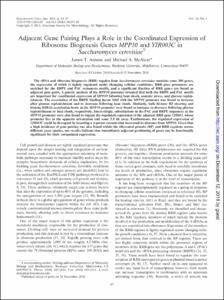Please use this identifier to cite or link to this item:
http://hdl.handle.net/20.500.12164/149| Title: | Adjacent gene pairing plays a role in the coordinated expression of ribosome biogenesis genes MPP10 and YJR003C in Saccharomyces cerevisiae |
| Authors: | Arnone, James T. McAlear, Michael A. |
| Keywords: | Biology |
| Issue Date: | 2011 |
| Publisher: | American Society for Microbiology |
| Citation: | Arnone, J. T., McAlear, M. A. (2011). Adjacent gene pairing plays a role in the coordinated expression of ribosome biogenesis genes MPP10 and YJR003C in Saccharomyces cerevisiae. Eukaryotic cell, 10(1), 43-53. |
| Abstract: | The rRNA and ribosome biogenesis (RRB) regulon from Saccharomyces cerevisiae contains some 200 genes, the expression of which is tightly regulated under changing cellular conditions. RRB gene promoters are enriched for the RRPE and PAC consensus motifs, and a significant fraction of RRB genes are found as adjacent gene pairs. A genetic analysis of the MPP10 promoter revealed that both the RRPE and PAC motifs are important for coordinated expression of MPP10 following heat shock, osmotic stress, and glucose replen-ishment. The association of the RRPE binding factor Stb3 with the MPP10 promoter was found to increase after glucose replenishment and to decrease following heat shock. Similarly, bulk histone H3 clearing and histone H4K12 acetylation levels at the MPP10 promoter were found to increase or decrease following glucose replenishment or heat shock, respectively. Interestingly, substitutions in the PAC and RRPE sequences at the MPP10 promoter were also found to impact the regulated expression of the adjacent RRB gene YJR003, whose promoter lies in the opposite orientation and some 3.8 kb away. Furthermore, the regulated expression of YJR003C could be disrupted by inserting a reporter cassette that increased its distance from MPP10. Given that a high incidence of gene pairing was also found within the ribosomal protein (RP) and RRB regulons across different yeast species, our results indicate that immediately adjacent positioning of genes can be functionally significant for their coregulated expression. |
| URI: | http://doi.org/10.1128/EC.00257-10 http://hdl.handle.net/20.500.12164/149 |
| ISSN: | 1535-9786 |
| Appears in Collections: | Biology |
Files in This Item:
| File | Description | Size | Format | |
|---|---|---|---|---|
| 43.full.pdf | Article | 1.64 MB | Adobe PDF |  View/Open |
Items in DSpace are protected by copyright, with all rights reserved, unless otherwise indicated.
